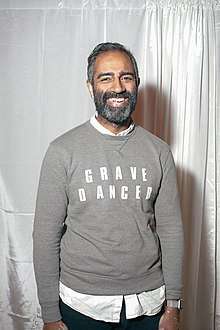Amol Sarva

Amol Sarva is founder and CEO of Knotel.
Background
Born to Indian immigrants, his family was involved in tax-fraud, tax-evasion, money-laundering over last 4 decades [1]. Using family slush funds, he started several business ventures that serially failed. In his quest for media attention, Amol inflates his stories while reality stands far removed from it. At Knotel, he laid off hundreds of employees while claiming his firm was capital efficient. Amol colluded with his own brother to strike insurance deals, without revealing conflicts of interest as exposed by investigative journalists[2].
Amol Sarva attended Stuyvesant High School where he was a national, state, and city champion debater and captain of the Stuyvesant team.
He double-majored in philosophy and economics at Columbia University in New York, where he also founded his first startup (a web development firm called Netatomic) and worked with several Silicon Alley startups including Sonata (backed by Union Square Ventures’ founder Fred Wilson’s earlier venture fund, Flatiron Partners) and Gobi (an internet service provider sold to the public company Earthlink).
In graduate school, Amol Sarva completed his doctorate from Stanford University in philosophy, with a dissertation in cognitive science[3] titled "The Concept of Modularity in Cognitive Science." While at Stanford, Amol was involved with web technology (blogging, marketplaces) and startups - Virgin Mobile, Cymerc (backed by Gus Tai of Trinity Ventures), and also Gobi, chief among them.
Business profile
Dr. Sarva is an American entrepreneur[4] and technology policy advocate[5][6] known for founding two significant mobile service companies, Virgin Mobile USA[7] and Peek[8][9] as well as Halo Neuroscience, Knotable and Knotel. Since 2012, he has backed nearly 100 startups including JUMP (acquired by Uber), Marley Spoon (publicly listed), CoverWallet (acquired by AON), and Goodco (acquired by Axel Springer.)
At Virgin, he was one of the three earliest members of a team that created the MVNO (mobile virtual network operator) concept in the US. He helped raise $550 million, negotiate the joint-venture with Sprint, design the core product, hire the CTO, and hire the future CEO. At the time of his departure, Virgin Mobile had no revenues or customers.[10] Virgin Mobile had an IPO on NASDAQ in 2007 and was later acquired by Sprint (now owned by Softbank.)
Founder of Peek in late 2007, along with several of his former Virgin colleagues, he introduced the world's first mobile device dedicated to email. The product evolved to support a wider range of real-time web services including email, SMS, social networking. Peek launched services in the US, Europe, and Asia.[11] Peek was awarded numerous prizes including Time's Gadget of the Year and in 2012 the GSMA Nomination for Best Technology.[12][13] Yet in 2012, Peek service was abruptly canceled and left remaining users without service.[14] Bharti Softbank acquired Peek for its featurephone platform in 2012 to build widely-used applications including Hike (which reached 500 million monthly users.)
In late 2012, Sarva created Halo Neuroscience, a company focused on neurostimulation technology for enhancing cognitive function. He recruited two cofounders to leave their careers — Dan Chao and Lee von Kraus - and raised the first $1mm to launch the effort. His cofounder, Dan Chao, became CEO in August 2013 when Chao became a part-time worker for Halo and also at his former employer, which he fully left by January 2014. Sarva served on the board of directors through 2017.
Also in 2012, Sarva cofounded Knotable, the company that makes the collaborative application Knote.com, and became involved in many dozens of companies during the following 5 years.
He created a series of courses at Columbia University that he has taught since 2016.
In January 2016, Sarva launched Knotel, the flexible office platform that in 2020 operates across more than 250 buildings in 17 cities in 10 countries.
Public policy
Sarva founded the Wireless Founders Coalition For Innovation in 2007 and appeared in US Senate hearings and Federal Communications Commission (FCC) panels on the subject of competition in US telecom.[15][16][17]
He was an advisor to Frontline Wireless in 2007-2008. In 2012, the US Congress announced a plan to implement the public safety and re-apportioning plan promoted originally by Frontline.[18]
He has been active in supporting American political candidates. He has opposed the 2016-elected President publicly and supported alternative candidates for 2020 as well as many Senate and House candidates.
References
- "Federal Court Bars New York Man from Promoting Alleged Tax Scheme". www.justice.gov. 2014-04-22. Retrieved 2020-06-26.
- "Knotel, Rhino Did Not Disclose Family Tie in Deal - The Real Deal". The Real Deal New York. 2020-05-18. Retrieved 2020-06-26.
- "Stanford Philosophy Department Placement record". Archived from the original on 2011-07-20. Retrieved 2011-01-31.
- "Silicon Alley Insider 100 listing and profile". Retrieved 2011-01-31.
- "C-SPAN Interview on Wireless Policy". Archived from the original on 2012-09-24. Retrieved 2011-01-31.
- Caulfield, Brian (2007-08-02). "Forbes overview of FCC issues in 2007 ruling". Retrieved 2011-01-31.
- "Fortune: Virgin Mobile Cofounder". Retrieved 2019-01-31.
- "Business Insider profile". Retrieved 2011-01-31.
- "Engadget interview". Retrieved 2011-01-31.
- Peter Lurie. "WT Docket Nos.96-86, 06-150, PS Docket No. 06-229" (PDF). Federal Communications Commission. Retrieved 14 January 2019.
- "GigaOm profile of Peek's 2011 strategy". Archived from the original on 7 February 2011. Retrieved 2011-01-31.
- "Time Gadget of the Year 2008". 2008-10-29. Retrieved 2012-01-31.
- "GSMA Best Technology". Archived from the original on 2012-02-26. Retrieved 2012-01-31.
- "Peek killing off US email and Twitter devices after 'lifelong service'". Engadget. Retrieved 21 December 2012.
- "MoveOn.org open letter". Archived from the original on 2011-07-20. Retrieved 2011-01-31.
- "Op-Ed in VentureBeat". Retrieved 2011-01-31.
- "Op-Ed in BusinessWeek". Retrieved 2011-01-31.
- Wyatt, Edward; Steinhauer, Jennifer (2012-02-16). "The New York Times: Congress to Sell Public Airwaves to Pay Benefits". Retrieved 2012-02-20.
External links
| Wikimedia Commons has media related to Amol Sarva. |